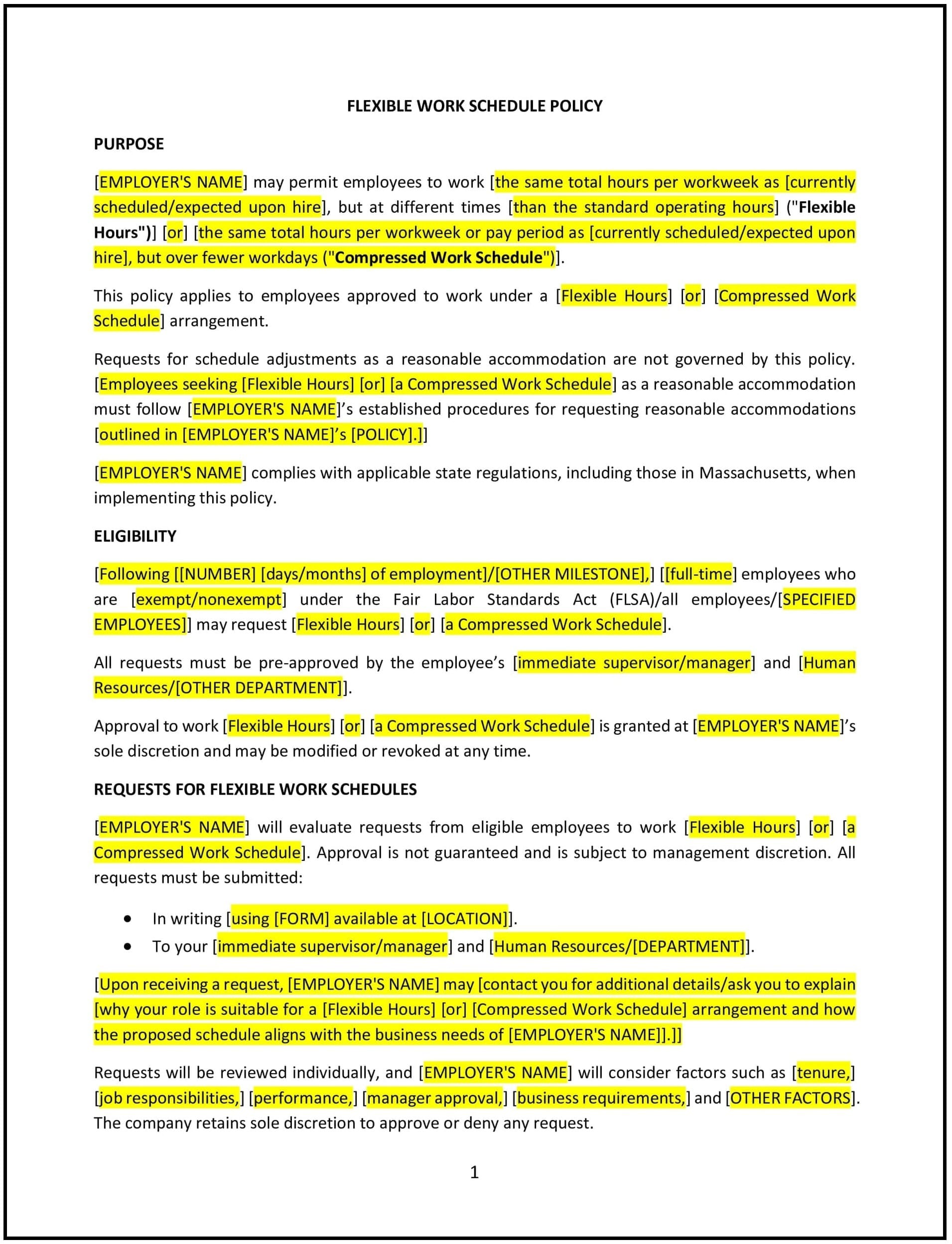Flexible work schedule policy (Massachusetts): Free template
Got contracts to review? While you're here for policies, let Cobrief make contract review effortless—start your free review now.

Customize this template for free
This flexible work schedule policy is designed to help Massachusetts businesses establish guidelines for offering flexible work schedules to employees. The policy outlines how employees can request flexible work arrangements, such as adjusted hours or remote work, while ensuring that business operations remain efficient and effective. It provides a framework for balancing employee needs with company objectives and outlines expectations for performance, communication, and accountability in a flexible work environment.
By adopting this policy, businesses can improve employee work-life balance, attract and retain talent, and maintain productivity while offering more flexibility in how employees manage their work schedules.
How to use this flexible work schedule policy (Massachusetts)
- Define flexible work schedule options: Clearly specify the types of flexible work arrangements available, such as flexible hours, compressed workweeks, job sharing, or remote work. The policy should outline which types of work schedules are eligible and under what circumstances.
- Establish eligibility criteria: Specify the eligibility requirements for employees to participate in the flexible work schedule program. This may include factors such as job responsibilities, performance, tenure, or department-specific needs.
- Outline the approval process: Define the process for requesting a flexible work schedule, including how employees should submit their requests, the timeline for approval, and who is responsible for reviewing and approving the requests.
- Set expectations for performance and accountability: Establish clear performance expectations for employees on flexible work schedules, such as meeting deadlines, attending meetings, and maintaining productivity. The policy should specify how performance will be monitored and evaluated.
- Address communication requirements: Set guidelines for how employees on flexible schedules should communicate with managers and coworkers. This includes expectations for availability, regular check-ins, and participation in team meetings.
- Specify the duration of flexible work arrangements: Define how long flexible work arrangements will last, whether they are permanent or temporary, and how often the company will review them. The policy should also explain the process for adjusting or terminating flexible work schedules if necessary.
- Ensure compliance with Massachusetts and federal laws: Ensure that the flexible work schedule policy complies with Massachusetts state labor laws, including the Massachusetts Fair Employment Practices Law, and federal regulations, such as the Fair Labor Standards Act (FLSA), regarding compensation for work hours and overtime.
- Review and update regularly: Periodically review and update the policy to reflect changes in business needs, employee preferences, or legal requirements.
Benefits of using this flexible work schedule policy (Massachusetts)
This policy offers several benefits for Massachusetts businesses:
- Improves employee work-life balance: Flexible work schedules allow employees to better manage their personal and professional responsibilities, leading to improved work-life balance and overall well-being.
- Increases employee satisfaction and retention: Offering flexible work options can increase employee satisfaction, leading to higher retention rates, reduced turnover, and a more loyal workforce.
- Enhances productivity: Flexible work schedules can improve productivity by allowing employees to work during their most productive hours and reducing time spent commuting.
- Attracts top talent: Companies that offer flexible work arrangements are more likely to attract top candidates, particularly those seeking work-life balance or who need flexibility due to family, health, or other personal reasons.
- Supports diversity and inclusion: Flexible work schedules can support diversity and inclusion efforts by accommodating employees with different needs, such as parents, caregivers, or employees with disabilities.
- Reduces absenteeism: By offering employees flexibility, businesses may see a reduction in absenteeism, as employees are better able to manage personal appointments, family needs, and other obligations without taking excessive time off.
Tips for using this flexible work schedule policy (Massachusetts)
- Communicate the policy clearly: Ensure that all employees are aware of the flexible work schedule policy and understand the guidelines, eligibility requirements, and the process for requesting flexible schedules.
- Set clear expectations: Clearly communicate expectations regarding work hours, availability, and performance to ensure that employees meet business objectives while benefiting from flexibility.
- Monitor and evaluate performance: Regularly assess employee performance to ensure that flexible work arrangements do not negatively impact productivity or team collaboration. Provide feedback and support as needed to help employees succeed in their flexible schedules.
- Offer flexibility while maintaining business needs: Balance the needs of the business with employees’ desire for flexibility. The policy should ensure that flexibility does not compromise key operational goals, deadlines, or team collaboration.
- Provide tools and support: Offer employees the necessary tools, resources, and support to succeed in a flexible work environment. This may include providing remote work technology, collaboration tools, and access to necessary software.
- Review and update regularly: Periodically review the policy to ensure it continues to meet the company’s goals and aligns with employee preferences, while also complying with any changes in Massachusetts state laws or federal regulations.